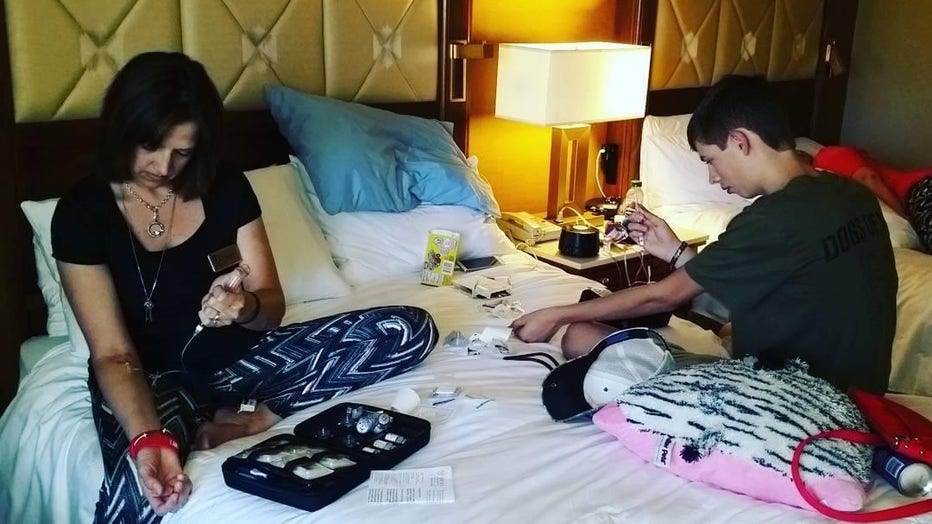Georgia mother and son both diagnosed with hemophilia
MCDONOUGH, Ga. - Stormy Johnson, of McDonough, says she knew something was very wrong back in 2002, when she woke up one morning and found blood in her bed, where her then 3-year-old son Collin had fallen asleep.
A few days earlier, Collin had undergone a tonsillectomy.
"I run, look in his bed, and literally there was like a puddle of blood, like this big, where he had been sleeping," Johnson remembers.
After a trip to the emergency department and some follow-up tests, Collin was diagnosed with hemophilia B, an inherited bleeding disorder.
His body doesn't produce enough of a protein known as factor IX which allows his blood to clot properly.
The Johnsons were told Colin has a mild form of the disorder, in which his blood will slowly clot, but the clot does not always hold.
Dr. Robert Sidonio, Jr., the associate director of the Hemostasis and Thrombosis program at Children's Healthcare of Atlanta, treated Colin.
Sidonio says hemophilia B affects the blood's ability to form a clot.
"So, patients may or may not have any bleeding symptoms from day to day, but the most minor of trauma may cause significant bleeding," Dr. Sidonio explains. "And, they can bleed into their muscles, into the joints and, in severe situations, into the brain and to the abdomen as well."
If her son hit his head hard or cut himself, Johnson learned, that could trigger uncontrolled bleeding.
"So, it always meant stopping what you're doing, driving to Atlanta, getting a CT scan done, getting an infusion," she says.
Collin was just 11 when he learned how to give himself factor IX injections to help his blood clot.
And, over time, his mother began to suspect she, too, had the same bleeding disorder.
"My periods probably were my first sign," Johnson says. "I mean, I literally would have like 40- to 45-day periods sometimes."
But, Johnson says, she was told that while she is carrier of the gene mutation that causes hemophilia B, the disorder primarily affects males.
When women do have symptoms, Johnson was told, they are usually mild, so women often do not need treatment.
"If you read all the textbooks, they will say hemophilia affects males," Dr. Sidonio says.
But, he says, the research studies clearly demonstrate that, while hemophilia is more common in males, women, who are carriers of the gene mutation, can have bleeding issues, too.
"So, we always say we should manage the disorder, not the gender, and that should be the focus: is managing the severity of the disease," Dr. Sidonio says.
It wasn't until 2015, when she was 47, a doctor in Nevada diagnosed Johnson with hemophilia B, and prescribed weekly injections of factor IX to try to prevent bleeding problems.

Stormy Johnson and her son Collin give themselves injections of factor IX, a protein designed to help their blood clot.
Still, she says, she has had some push back about the injections.
"I've had a lot of people, especially family, say to me, 'You went 47 years without medication, so why do you need it now,'" Johnson says. "And, my answer is always, 'If I can feel better, why not?'"
Dr. Sidonio says there is growing research that shows some girls and women with hemophilia B may need treatment just as boys and men do
"The main thing that we're focusing on is that they get seen in our clinics the same way that the men do, that they get identified, diagnosed and then properly managed," he says.
Stormy Johnson says getting help for Collin, who is now in his twenties and doing well, helped her get answers.
"I found my voice for him that I may not have been able to find for myself," she says. "So I'm always reminding women that you can go to another doctors.
Stormy Johnson's journey is part of a campaign called "Portraits of Progress". It includes a multi-media display depicting people linked to hemophilia--including patients.

